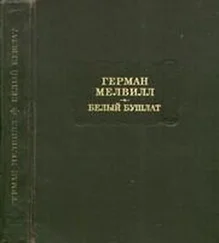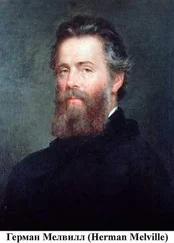It hung upon an impending cliff, sheltered on two sides by tangled thickets, and half–screened from view in front by juttings of the rude stairway, which climbed the precipice from the sea. Built of canes, it was thatched with long, mildewed grass. It seemed an abandoned hay–rick, whose haymakers were now no more. The roof inclined but one way; the eaves coming to within two feet of the ground. And here was a simple apparatus to collect the dews, or rather doubly–distilled and finest winnowed rains, which, in mercy or in mockery, the night–skies sometimes drop upon these blighted Encantadas. All along beneath the eaves, a spotted sheet, quite weather–stained, was spread, pinned to short, upright stakes, set in the shallow sand. A small clinker, thrown into the cloth, weighed its middle down, thereby straining all moisture into a calabash placed below. This vessel supplied each drop of water ever drunk upon the isle by the Cholos. Hunilla told us the calabash, would sometimes, but not often, be half filled overnight. It held six quarts, perhaps. "But," said she, "we were used to thirst. At sandy Payta, where I live, no shower from heaven ever fell; all the water there is brought on mules from the inland vales."
Tied among the thickets were some twenty moaning tortoises, supplying Hunilla's lonely larder; while hundreds of vast tableted black bucklers, like displaced, shattered tomb–stones of dark slate, were also scattered round. These were the skeleton backs of those great tortoises from which Felipe and Truxill had made their precious oil. Several large calabashes and two goodly kegs were filled with it. In a pot near by were the caked crusts of a quantity which had been permitted to evaporate. "They meant to have strained it off next day," said Hunilla, as she turned aside.
I forgot to mention the most singular sight of all, though the first that greeted us after landing.
Some ten small, soft–haired, ringleted dogs, of a beautiful breed, peculiar to Peru, set up a concert of glad welcomings when we gained the beach, which was responded to by Hunilla. Some of these dogs had, since her widowhood, been born upon the isle, the progeny of the two brought from Payta. Owing to the jagged steeps and pitfalls, tortuous thickets, sunken clefts and perilous intricacies of all sorts in the interior, Hunilla, admonished by the loss of one favorite among them, never allowed these delicate creatures to follow her in her occasional birds'–nests climbs and other wanderings; so that, through long habituation, they offered not to follow, when that morning she crossed the land, and her own soul was then too full of other things to heed their lingering behind. Yet, all along she had so clung to them, that, besides what moisture they lapped up at early daybreak from the small scoop–holes among the adjacent rocks, she had shared the dew of her calabash among them; never laying by any considerable store against those prolonged and utter droughts which, in some disastrous seasons, warp these isles.
Having pointed out, at our desire, what few things she would like transported to the ship—her chest, the oil, not omitting the live tortoises which she intended for a grateful present to our Captain—we immediately set to work, carrying them to the boat down the long, sloping stair of deeply–shadowed rock. While my comrades were thus employed, I looked and Hunilla had disappeared.
It was not curiosity alone, but, it seems to me, something different mingled with it, which prompted me to drop my tortoise, and once more gaze slowly around. I remembered the husband buried by Hunilla's hands. A narrow pathway led into a dense part of the thickets. Following it through many mazes, I came out upon a small, round, open space, deeply chambered there.
The mound rose in the middle; a bare heap of finest sand, like that unverdured heap found at the bottom of an hour–glass run out. At its head stood the cross of withered sticks; the dry, peeled bark still fraying from it; its transverse limb tied up with rope, and forlornly adroop in the silent air.
Hunilla was partly prostrate upon the grave; her dark head bowed, and lost in her long, loosened Indian hair; her hands extended to the cross–foot, with a little brass crucifix clasped between; a crucifix worn featureless, like an ancient graven knocker long plied in vain. She did not see me, and I made no noise, but slid aside, and left the spot.
A few moments ere all was ready for our going, she reappeared among us. I looked into her eyes, but saw no tear. There was something which seemed strangely haughty in her air, and yet it was the air of woe. A Spanish and an Indian grief, which would not visibly lament. Pride's height in vain abased to proneness on the rack; nature's pride subduing nature's torture.
Like pages the small and silken dogs surrounded her, as she slowly descended towards the beach. She caught the two most eager creatures in her arms:—"Mia Teeta! Mia Tomoteeta!" and fondling them, inquired how many could we take on board.
The mate commanded the boat's crew; not a hard–hearted man, but his way of life had been such that in most things, even in the smallest, simple utility was his leading motive.
"We cannot take them all, Hunilla; our supplies are short; the winds are unreliable; we may be a good many days going to Tombez. So take those you have, Hunilla; but no more."
She was in the boat; the oarsmen, too, were seated; all save one, who stood ready to push off and then spring himself. With the sagacity of their race, the dogs now seemed aware that they were in the very instant of being deserted upon a barren strand. The gunwales of the boat were high; its prow—presented inland—was lifted; so owing to the water, which they seemed instinctively to shun, the dogs could not well leap into the little craft. But their busy paws hard scraped the prow, as it had been some farmer's door shutting them out from shelter in a winter storm. A clamorous agony of alarm. They did not howl, or whine; they all but spoke.
"Push off! Give way!" cried the mate. The boat gave one heavy drag and lurch, and next moment shot swiftly from the beach, turned on her heel, and sped. The dogs ran howling along the water's marge; now pausing to gaze at the flying boat, then motioning as if to leap in chase, but mysteriously withheld themselves; and again ran howling along the beach. Had they been human beings, hardly would they have more vividly inspired the sense of desolation. The oars were plied as confederate feathers of two wings. No one spoke. I looked back upon the beach, and then upon Hunilla, but her face was set in a stern dusky calm. The dogs crouching in her lap vainly licked her rigid hands. She never looked be her: but sat motionless, till we turned a promontory of the coast and lost all sights and sounds astern. She seemed as one who, having experienced the sharpest of mortal pangs, was henceforth content to have all lesser heartstrings riven, one by one. To Hunilla, pain seemed so necessary, that pain in other beings, though by love and sympathy made her own, was unrepiningly to be borne. A heart of yearning in a frame of steel. A heart of earthly yearning, frozen by the frost which falleth from the sky.
The sequel is soon told. After a long passage, vexed by calms and baffling winds, we made the little port of Tombez in Peru, there to recruit the ship. Payta was not very distant. Our captain sold the tortoise oil to a Tombez merchant; and adding to the silver a contribution from all hands, gave it to our silent passenger, who knew not what the mariners had done.
The last seen of lone Hunilla she was passing into Payta town, riding upon a small gray ass; and before her on the ass's shoulders, she eyed the jointed workings of the beast's armorial cross.
Sketch Ninth.
Hood's Isle and the Hermit Oberlus.
Читать дальше








